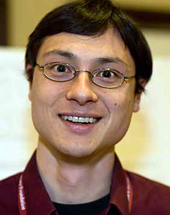Jeff Gore, PhD

Jeff Gore, PhD, is a professor of physics at MIT, and leads Gore Laboratory, which is composed of an interdisciplinary group of scientists interested in learning from each other to effectively combine experiments, theory and modeling.
Jeff’s research interests have ranged widely, from the current focus on ecological dynamics to his single-molecule research in graduate school with the Bustamante laboratory. Before starting his own lab, Jeff was a Pappalardo Fellow in the Physics Department at MIT working with the van Oudenaarden laboratory studying cooperation and cheating in yeast.
Previously, he studied the evolution of cooperation in the laboratory of MIT Professor Alexander van Oudenaarden. The conditions required for the initiation and maintenance of cooperation is a classic problem in evolutionary biology with deep connections to game theory. Any evolutionary stable state between competing strategies must also be a Nash Equilibrium of the corresponding “game.”
As a model system to explore competition and cooperation experimentally, Jeff is studying the metabolism of sucrose by yeast. The first step of the digestion of the disaccharide sucrose involves enzymatic breakdown of the molecule into its two constituent monosaccharides. This reaction is done outside the cell, making it possible for neighboring cells to “cheat” by consuming the monosaccharides created by other cells.
Jeff finished his undergraduate studies in physics, mathematics, and economics at MIT in 1999, and as a Hertz Fellow, obtained his PhD from the University of California, Berkeley, in 2005. His research in single-molecule biophysics was done in the laboratory of Carlos Bustamante, focusing on the study of twist and torque in single molecules of DNA.
Graduate Studies
Undergraduate Studies
Awards
2011, Sloan Research Fellow, Alfred P. Sloan Foundation
2012, Director’s New Innovator Award, National Institutes of Health
National Science Foundation Career Award recipient